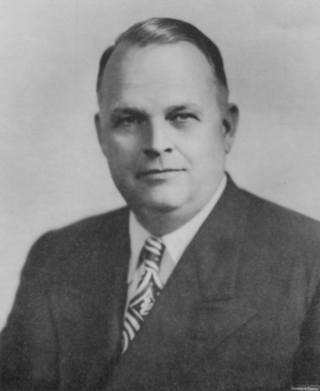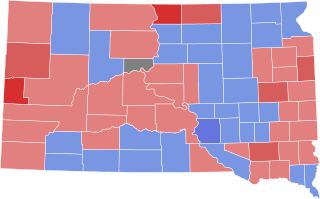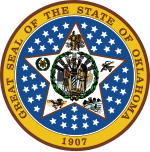
The 1912–13 United States Senate elections were held on various dates in various states. They were the last U.S. Senate elections before the ratification of the Seventeenth Amendment in 1913, establishing direct elections for all Senate seats. Senators had been primarily chosen by state legislatures. Senators were elected over a wide range of time throughout 1912 and 1913, and a seat may have been filled months late or remained vacant due to legislative deadlock. Some states elected their senators directly even before passage of Seventeenth Amendment. Oregon pioneered direct election and experimented with different measures over several years until it succeeded in 1907. Soon after, Nebraska followed suit and laid the foundation for other states to adopt measures reflecting the people's will. By 1912, as many as 29 states elected senators either as nominees of their party's primary or in conjunction with a general election.

The 1944 United States Senate election in Oklahoma took place on November 7, 1944. Incumbent Democratic Senator Elmer Thomas ran for re-election to a fourth term. Thomas once again faced a stiff challenge in the Democratic primary, this time from Congressman Wesley E. Disney and Lieutenant Governor James E. Berry. As was the case in 1938, Thomas won renomination only with a narrow plurality. In the general election, he faced former State Senator William J. Otjen, the 1942 Republican nominee for Governor. Though Thomas's performance was much reduced compared to six years prior, he still defeated Otjen by a wide margin.

The 1948 United States Senate election in Oklahoma took place on November 2, 1948. Incumbent Republican Senator Edward H. Moore declined to run for re-election. A crowded Democratic primary, including the former Governor, multiple members of Congress, and several statewide elected officials, developed; former Governor Robert S. Kerr won a slim plurality in the initial primary and then defeated former Congressman Gomer Smith by a wide margin in the runoff. On the Republican side, Congressman Ross Rizley had an easy path to the nomination. Kerr defeated Rizley in a landslide, largely similar to President Harry S. Truman's landslide victory in Oklahoma over Republican presidential nominee Thomas E. Dewey.

The 1932 United States Senate election in Oklahoma took place on November 8, 1932. Incumbent Democratic senator Elmer Thomas ran for re-election to a second term. Thomas faced a crowded path to renomination, and only won the Democratic primary following a runoff election with attorney Gomer Smith. On the Republican side, oil magnate Wirt Franklin similarly won the Republican nomination in a runoff election. Thomas overwhelmingly defeated Franklin to win re-election, aided by Democratic presidential nominee Franklin D. Roosevelt's landslide win in Oklahoma over Republican president Herbert Hoover.
James Edward Berry was an American politician who served as the sixth lieutenant governor of Oklahoma from 1935 to 1955. No other person has beaten or even tied Berry's record for holding that office. Although he tried twice to win a seat in the U.S. Senate, he was unsuccessful in both attempts. He was finally upset in a primary runoff election against Cowboy Pink Williams in 1954.

The 2014 United States House of Representatives elections in Oklahoma were held on Tuesday, November 4, 2014, to elect the five U.S. representatives from the state of Oklahoma, one from each of the state's five congressional districts. The elections coincided with other elections to the United States Senate and House of Representatives and various state and local elections, including the Governor of Oklahoma and both of Oklahoma's United States Senate seats. Primary elections were held on June 24, 2014. Primary runoffs were held on August 26, 2014, in contests where no candidate won more than 50% of the vote.

The 1920 United States Senate election in Oklahoma took place on November 2, 1920. Incumbent Democratic Senator Thomas Gore ran for re-election to a third term. However, he was defeated in the Democratic primary by Congressman Scott Ferris. In the general election, Ferris faced fellow Congressman John W. Harreld, the Republican nominee. Likely helped by Republican presidential nominee Warren G. Harding's victory in Oklahoma over Democratic nominee James M. Cox, Harreld defeated Ferris by a similar margin to Harding's.

The 1942 United States Senate election in Oklahoma took place on November 3, 1942. Incumbent Democratic Senator Joshua B. Lee ran for re-election to a second consecutive term. After winning the Democratic primary against several strong opponents, Lee advanced to the general election, where he was originally set to face former Republican Senator William B. Pine. However, shortly after winning the Republican primary, Pine died; the state Republican Party tapped businessman Edward H. Moore as its replacement nominee. In a favorable Republican environment, Moore defeated Lee by a wide margin to win his first and only term in the U.S. Senate.

The 1956 United States Senate election in Oklahoma took place on November 6, 1956. Incumbent Democratic Senator Mike Monroney ran for re-election to a second term. He avoided a contentious Democratic primary when Lieutenant Governor Cowboy Pink Williams declined to challenge him and easily won renomination. In the general election, he faced Republican state party chairman Douglas McKeever. Even though President Dwight D. Eisenhower was winning the state handily, Monroney won re-election by a wide margin.

The 1950 United States Senate election in Oklahoma took place on November 7, 1950. Incumbent Democratic Senator Elmer Thomas ran for re-election to a fifth term. However, though he had successfully beat back primary challengers in past elections, he was ultimately defeated by Congressman Mike Monroney. Monroney advanced to the general election, where he faced Reverend Bill Alexander, the Republican nominee. Despite the national Republican landslide, Monroney defeated Alexander by a wide margin, holding the seat for the Democratic Party.

The 1914 United States Senate election in Oklahoma took place on November 3, 1914. Incumbent Senator Thomas Gore, a Democrat, sought re-election in his first popular election. He was challenged by Republican nominee John H. Burford, a former Justice on the Territorial Oklahoma Supreme Court; Socialist nominee Patrick S. Nargle, a former U.S. Marshal; and Progressive nominee William O. Cromwell, the former State Attorney General. Despite the fact that the left-leaning vote was split several ways in the election, Gore won re-election in a landslide, receiving 48% of the vote to Burford's 29, Nagle's 21%, and Cromwell's 2%.

The 1924 United States Senate election in Oklahoma took place on November 4, 1924. Incumbent Democratic Senator Robert Latham Owen declined to run for re-election. In a crowded Democratic primary, impeached former Governor Jack C. Walton won the party's nomination with a narrow plurality. In the general election, he faced businessman William B. Pine, the Republican nominee. Though Democratic presidential nominee John W. Davis narrowly won the state over President Calvin Coolidge, Walton's unpopularity and controversy caused Democrats to lose the seat; Pine defeated Walton in a landslide.

The 1926 United States Senate election in Oklahoma took place on November 2, 1926. Incumbent Republican Senator John W. Harreld ran for re-election to a second term. After facing many challengers in a crowded Republican primary, he advanced to the general election. In the Democratic primary, Congressman Elmer Thomas beat out a similarly crowded field, which included former Governor Jack C. Walton, to win his party's nomination with a plurality. In the general election, Thomas defeated Herrald in a landslide, winning his first of four terms in the U.S. Senate.

The 1936 United States Senate election in Oklahoma took place on November 3, 1936. Incumbent Democratic Senator Thomas Gore ran for re-election to his second consecutive term, and fifth term overall. He ended up easily losing renomination, however; he placed a distant fourth in the Democratic primary. A runoff election between Congressman Joshua B. Lee and Governor Ernest W. Marland resulted in a landslide win for Lee. In the general election, Lee faced Republican nominee Herbert K. Hyde, whom he overwhelmingly defeated.

The 1954 United States Senate election in Oklahoma took place on November 2, 1954. Incumbent Democratic Senator Robert S. Kerr ran for re-election to a second term. He faced strong competition in the Democratic primary from former Governor Roy J. Turner, and though he won a sizable victory over Turner in the primary, he fell shy of an outright majority. Turner, however, withdrew from the race before a runoff election could be held. On the Republican side, U.S. Attorney Fred Mock won the nomination following a runoff against newspaper publisher Raymond Fields. In the general election, Kerr ended up easily defeating Mock, but with a significantly reduced victory from 1948.

The 1960 United States Senate election in Oklahoma took place on November 8, 1960. Incumbent Democratic Senator Robert S. Kerr ran for re-election to a third term. He won the Democratic primary in a landslide and then faced former U.S. Attorney B. Hayden Crawford, the Republican nominee, in the general election. Even as Vice President Richard Nixon was winning Oklahoma in a landslide over John F. Kennedy, Kerr was able to defeat Crawford by a wide margin, winning his third term. However, Kerr died just shy of two years into his third term, on January 1, 1963. He was replaced by Governor J. Howard Edmondson in the Senate and a special election was held in 1964.

The 1962 United States Senate election in Oklahoma took place on November 6, 1962. Incumbent Democratic Senator Mike Monroney was re-elected to a third term. After winning a sizable victory in the Democratic primary, Monroney faced Republican former U.S. Attorney B. Hayden Crawford in the general election. Monroney won his last term in the Senate before his defeat in 1968. This election marks the last time that a Democrat has won Oklahoma's Class 3 Senate seat.

The 1964 United States Senate special election in Oklahoma took place on November 3, 1964. Democratic senator Robert S. Kerr, who won re-election to his third term in 1960, died in office on January 1, 1963. Governor J. Howard Edmondson resigned from office so that his lieutenant governor, George Nigh, could appoint him to the U.S. Senate. Edmondson ran for election in the ensuing special election, and faced strong competition from former governor Raymond D. Gary and State Senator Fred R. Harris. Edmondson placed first in the primary, but failed to win a majority, with Harris narrowly beating out Gary for second place. In the runoff, Harris defeated Edmondson in a landslide. In the general election, Harris faced former Oklahoma Sooners football coach Bud Wilkinson, the Republican nominee. Even though President Lyndon B. Johnson won Oklahoma by a wide margin over Republican presidential nominee Barry Goldwater, the Senate race was much closer. Ultimately, Harris only narrowly defeated Wilkinson by just 2% of the vote.

The 1966 United States Senate election in Oklahoma took place on November 8, 1966. Democratic Senator Fred R. Harris ran for re-election to a second term, and his first full term. After winning an easy victory in the Democratic primary, he faced attorney Pat J. Patterson, the Republican nominee, in the general election. Patterson wasn't viewed as a strong candidate against Harris, but the national Republican landslide helped make the race somewhat close. Harris ended up defeating Patterson by a comfortable margin to win his final term in the Senate.

The 1938 United States Senate elections in South Dakota took place on November 8, 1938. Incumbent Republican Senator Peter Norbeck died in office on December 20, 1936. Herbert E. Hitchcock was appointed by Governor Tom Berry as Norbeck's replacement. Two elections for the same Senate seat were held on the same day; one as a special election to fill the remainder of Norbeck's six-year term, and another to select a Senator to serve the next six-year term.


















